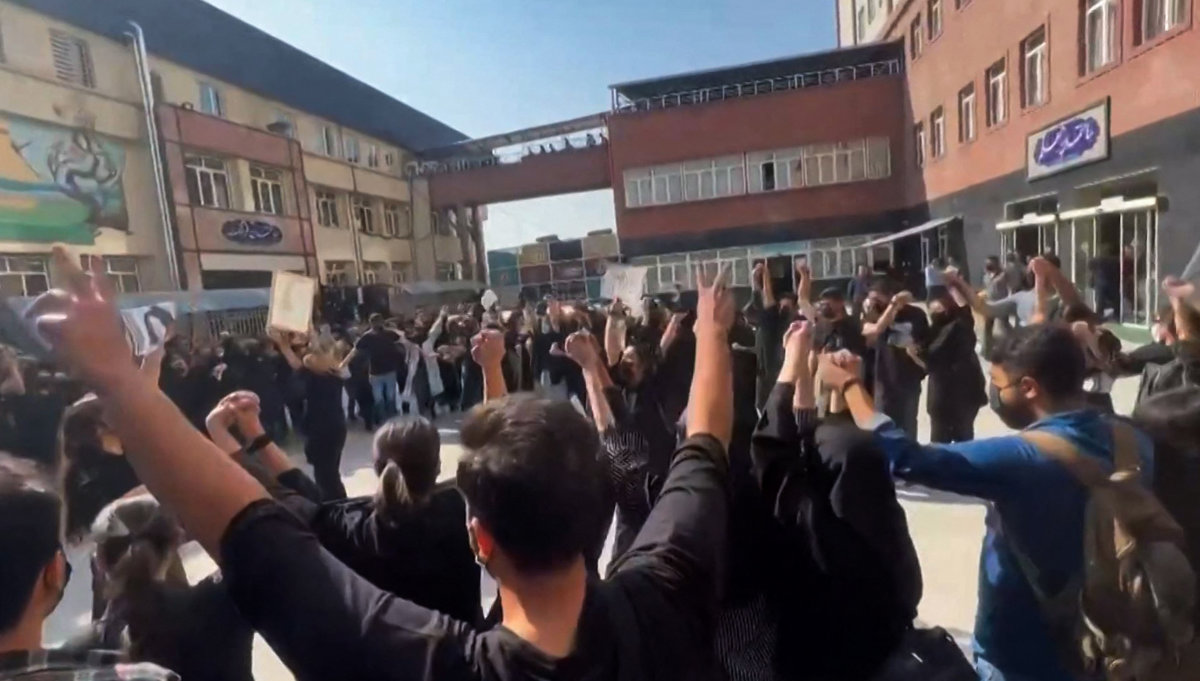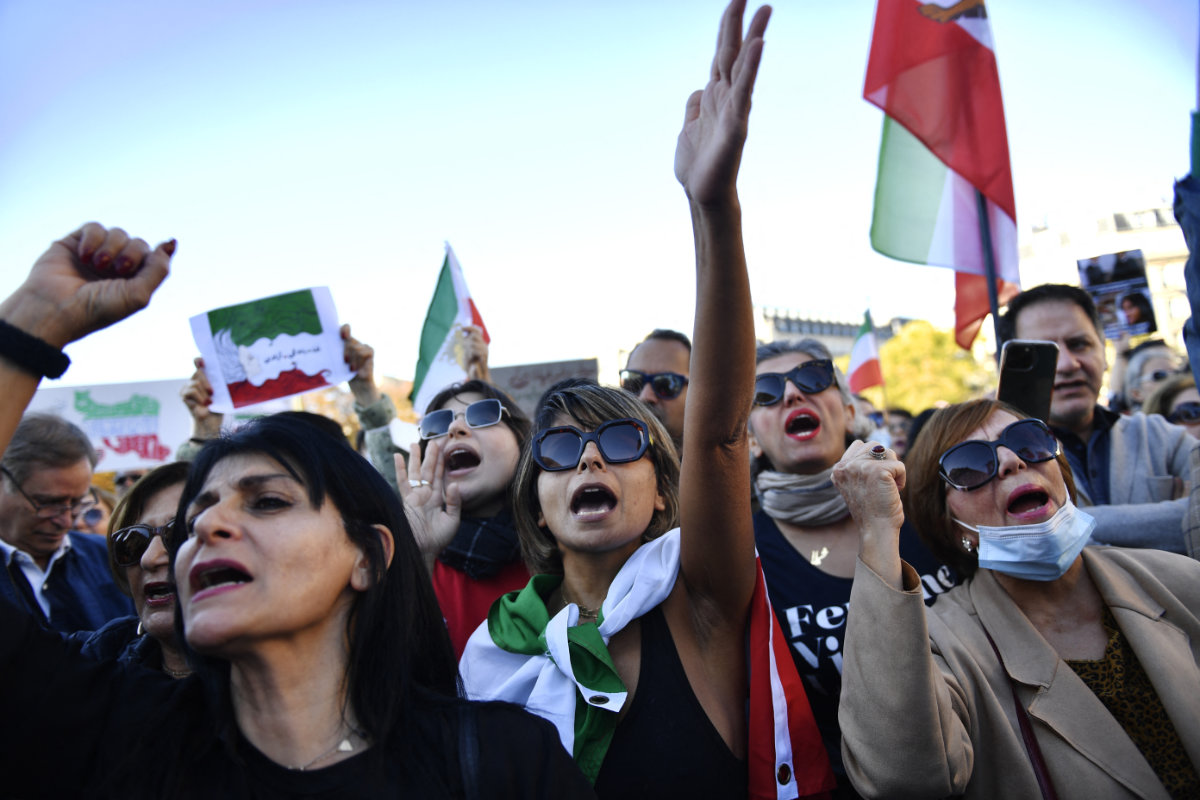DUBAI: As an unprecedented wave of civil unrest sweeps Iran, it is crucial that the world community, particularly Europe and the US, lends its support to the Iranian people and imposes greater sanctions on the regime in Tehran, according to the UK representative of an Iranian political opposition group.
“No matter what the mistakes, strategic mistakes, made by the United States, it is now time for the administration (of American President Joe Biden) to correct them and change its policy.
“It should stand with the Iranian people and support the demands of Iranian people for change,” Dowlat Nowrouzi, UK representative of the National Council of Resistance of Iran, told Katie Jensen, host of “Frankly Speaking,” the Arab News talk show which engages with leading policymakers and business leaders.

Dowlat Nowrouzi, shown on screen, being interviewed by Katie Jensen on Frankly Speaking. (AN photo)
The NCRI, founded in 1981, is a political coalition made up of various groups that aim to overthrow the Iranian regime. Most of its members have been forced into exile due to political persecution and operate out of Europe and other Western countries.
Nowrouzi’s plea for support for the Iranian people comes as the Islamic Republic continues to be rattled by protests triggered by the death of 22-year-old Kurdish woman Mahsa Amini in the morality police’s custody on Sept. 16.

Amini was detained for allegedly improperly wearing her headscarf, which is mandatory in Iran, and was pronounced dead at Tehran’s Kasra hospital two days later. While the authorities claimed she died of pre-existing medical conditions, her family, fellow detainees, and leaked medical records indicated that she was severely beaten.
What started as isolated protests during her funeral in her native Kurdistan province spread rapidly across Iran, snowballing into a nationwide uprising which has the potential to topple the Iranian regime.
According to Nowrouzi, more than 400 protesters have been killed by Iranian security forces, and the 20,000 people, including children, who have been arrested by the regime face horrific conditions amounting to torture and extrajudicial execution in prisons and detention centers.
Amid the state-orchestrated campaign of intimidation, Nowrouzi claimed that protesters remained resolute and committed to their goals.
She said: “Just a few days ago, we received information that 2,000 of them, especially youngsters and university students, were taken to a very notorious detention center called B Gate No. 6. In that detention center, they do all sorts of deadly torture against political prisoners as well as protesters.
“So, despite all that, they know what they are (engaged in) and they know that they’re going to have to sacrifice all that it takes in order to win back their country.
“I can assure you what is happening now is not going to stop. Iranians are on their way for a new democratic revolution in their country soon.”
Nowrouzi pointed out that although there had been other instances of nationwide civil unrest, most notably the protests of November 2019 and January 2020, which saw Iranian security forces kill thousands of protesters and arrest tens of thousands, “this one is absolutely different.”
She added: “It is a nationwide uprising movement. It has been able, it is mobilized. Some 178 major cities are engulfed in the protests and uprising. And I have to say, it covers almost all the 31 provinces throughout Iran. And this time you are seeing different sectors of Iranian society involved (in the uprising).”
Nowrouzi noted that the policy of appeasement that the US and other Western nations had adopted toward Iran had to change in order to ensure the success of the ongoing peaceful resistance.
“Unfortunately, this policy of appeasement has affected the ruling government. They have to realize it is now time for a very sharp change. As far as the US Congress is concerned, I can tell you it’s a different case because, particularly in the recent resolution 118, 260 members of Congress strongly supported Iranian people’s protests,” she said.
Resolution 118, which was introduced in Congress in February 2021, condemns what it calls Iran’s state-sponsored assassinations and terror attacks against US officials and Iranian dissidents, and expresses support for popular protests against the regime in Tehran.
Though such measures are certainly a step in the right direction, Nowrouzi added: “As far as the government is concerned, they have to do much more, (including meeting) some of the demands of the Iranian community and the opposition.”
She noted that depriving the Iranian regime of financial sources was crucial.
“They’re exporters of terrorism (and) they’re acquiring nuclear weapons, all of it by stealing the money and the national revenue of the Iranian people’s oil and gas, which are being spent by the mullahs on destruction rather than construction,” she said.
Protests and worker-led strikes have shut down major petrochemical facilities in Iran’s oil- and gas-rich southern provinces, which Nowrouzi sees as a significant development.
“It plays a very important role because it can (shut down) the mullahs’ economic (lifeline), particularly as far as money and trade is concerned,” she added.

This image grab from a UGC video made available on Oct.15, 2022, shows Iranian students protesting at Tehran University over the death of Mahsa Amini. (AFP)
Such actions, she said, took away the regime’s ability to finance their brutal acts against protesters. She noted that the mullahs acknowledged that 80 percent of the population lived below the poverty line, even though the country was enormously wealthy in terms of reserves of oil and gas.
Western countries, particularly the EU, could also play a critical role in shutting down the regime’s ability to crush any form of resistance, Nowrouzi said.
“I think they can play a very important role in order to actually side with the Iranian people and their major demands for freedom and democracy.
“In order to do that, in our view, Europeans have to do a lot more than just issue verbal condemnations of the atrocities of the mullahs, both in terms of the executions as well as the arbitrary arrests that they have been involved (in) during the past several weeks in this recent protest. We think they can, and they should, (recall) their ambassadors,” she added, referring to EU members.
“They have to close down the Iranian embassy in their countries, because as far as we know, in reality, they are used by the mullahs for all sorts of espionage, as well as for exporting terrorism and providing logistics, money, financial aid, and even military weapons, to their terrorist networks in Europe.”
Nowrouzi highlighted a terror plot in which Asadollah Asadi, the third diplomat of the Iranian embassy in Austria, brought a highly sophisticated bomb in his own personal suitcase through several European countries in order to target a rally held by the National Council of Resistance of Iran, in Paris.

Demonstrators rally in Paris on Oct. 9, 2022, in support of Iranian protests against he death of Iranian woman Mahsa Amini in Iran. (AFP)
“Thousands of government officials from over 70 countries were in attendance, and luckily, the plot was foiled, and Asadi and his co-conspirators arrested.”
Since the 1979 Islamic Revolution in Iran, the country has carried out more than 50 attacks, assassinations, and bombings on four different continents, killing hundreds of foreign officials, Iranian diplomats, and ordinary civilians. Intervention and concrete measures on the part of the US and EU, Nowrouzi said, could help to put an end to the state-sponsored terrorism.
“We are asking them to impose all sorts of comprehensive sanctions against the mullahs, especially the officials and the (Islamic) Revolutionary Guard Corps that are very much responsible for the executions and torture of our youngsters and women.
“We are also asking them to recognize the legitimate right of Iranian people to defend themselves and actually to continue their support, and to stay on the side of millions of Iranians demanding change and hope,” she added.
Nowrouzi pointed out the determination and resolve of the Iranian people to bring about change in their country.
“What I can assure you is that the Iranian people will continue to (protest) because they know what happened to Mahsa. It was not only Mahsa; the same thing could have happened to anybody else’s sister, wife, mother, or any other close brother.
“They know that the regime has been involved in all sorts of crimes against Iranian people. So, I can tell you that the vast majority of Iranian people are determined, and this determination will persist until we see the downfall of the regime,” she said.
She added that the protests had shown the world community that “the Iranian people, particularly women, who are the prime victim of this misogynist, brutal regime, are very much determined to bring about the change.
“They are fed up. They want democracy, a democratic republic with separation of religion from the state. And so, there is no way that any longer they would tolerate the inhumanity, barbarism, depression, and aggression of the mullahs.”
















